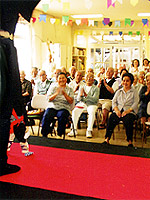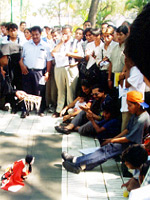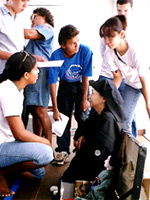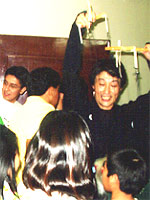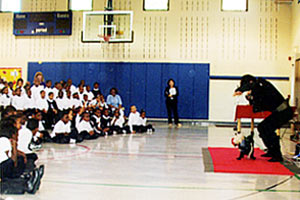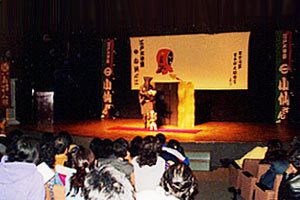|
Overseas Performance Tour Report, 2002. |
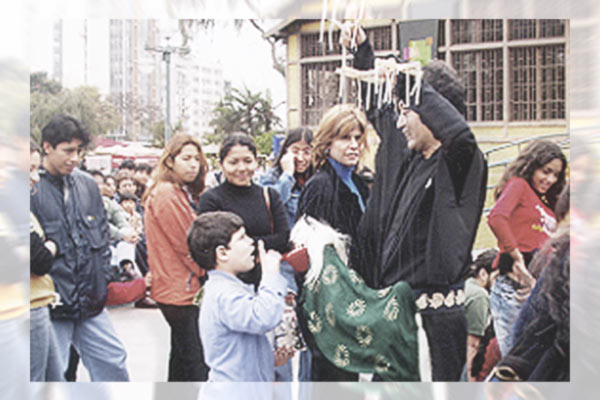 |
|
Notes, Mitsuru KAMIJO
-In case of our independence project tour, it took us lots of money to do it by ourselves even if we received local people's warm hospitality. We were provided aid in the form of part of the expenses for our overseas tour from The Japan Foundation, Mecenat, and six companies, but we resigned ourselves to operate in the red in this tour. Just then, The Japan Foundation introduced us other performances abroad program supported by them. We were very happy to receive the job. -We visited Chicago, Cleveland, Guanajuato in Mexico, Quito in Ecuador, Port of Spain in Trinidad and Tobago, Vina del Mar, Santiago in Chile, and Bogota in Colombia. -We had 20 stages in 28 days and 6000 people watched our performance. We were received by the embassy and the consulate in each country. We stayed at the hotel and we mainly played at the theater. Moreover, we could have more free time as compared with our independence project tour. We thought it was much easier tour for us. Some one told us, "I was sure that this tour was not hard for you, who visited terrible places. Oops, excuse me!" -Whenever we finished our stage, we stand up at the exit and see our guests off. We were spoken to in Japanese by many guests, "Konnichiwa-Hello.", "Arigato-Thank you.", and "Sayonara-Good bye." We heard in Quito that the Ecuadorian people were not interested in Japan at all. But, people came to have interest in Japan soon after The World Cup. -On the day of the final performance in Quito, when we began to explain how to play the marionette on our first curtain, some people came into the theater late. The people gradually overflowed the theater, so we had to interrupt our explanation to put them in order from the top of the stage. I heard later that the entrance was closed because the theater was full of people, and then the people who couldn't enter, struck the door and made a noise. It seemed a riot broke out. The number of the people was about 200. Therefore, we opened the entrance door all in a fluster. Then the aisle was blocked with the people and some people came up on the stage. But they became silent as soon as they settled down. Needless to say, we were very pleased to play in front of such hot people. -In Chicago, we suddenly decided to play at the colored elementary school. We could have only 20 minutes to play. But we had lots of fun to see their sensitive reaction to the movement of the doll. They reminded us the children in Palestine. We realized again children's sensitivity didn't have much difference all over the world. -Even if each country had different culture and different way, staff's excellence was common to all country. Except for one thing that we couldn't light up as we thought at all in the U.S because of the strong unionism, people understood very well what the stage was, loved the stage, and they were very cooperative. For example, I told them the audience couldn't see the dolls in Guanajuato and Vina del Mar, and then they immediately rifted up the stage. Because the sponsor didn't pay their wage in Guanajuato, the staff struck on the second day of our performance and they were replaced. But they were left to the end and told new staff accurately how and when to light up. -After our stage, some audiences sometimes came up to the stage to see the doll closer. Some of them were concerned with puppets and they gave us some earnest questions. And one of them gave us a chance to visit the doll theater in Colombia. It was a beautiful and easy to see the stage. We heard there were about 100 puppet companies in Colombia and Bogota had 6 doll theaters. On the other hand, Chile had only 15 puppet companies and they were getting old. They tried hard to bring up their successors. Thanks to our good reputation in Vina del Mar, 800 people came to see our performance in Santiago. -Bogota had many homeless children as well as other South American countries and they came to go into the drug business in the end. To avoid them from the drug business, the administration of Bogota tried to teach them juggling and how to make money by themselves. When the signal turned red in everywhere of the town, children run into the pedestrians' crossing. They played juggling there and scratched up some coins between the cars before they began to run. -We always think that it is only one time for us to play in front of the audience. So, we have tried to do our best under the different condition in each place to build the best stage. We were sorry to hear the local attendant said, "Some culture delegates from Japan got used to the reception and they spent their most of time on their sightseeing and pleasure after having only two or three stage." Or, "Some of them could come here by using their connection, but their stage was terrible and they gave us troubles." -We had a reception at the official residence of Port of Spain ambassador and we manipulated a doll for 30 minutes. The person of JICA was watching our play and said to us, "I usually watched the play in the backseat because I felt ashamed. But, today I was proud of your play though I could not see the doll but your face." We welcomed his word gratefully. -We could have many experiences and meet many people through these two tours. We want to treasure the people who met in our life. -Many people helped and cooperated with us. We would like to say thank you to all of them.
Ą details report Edo Marionette Group " South America Tour" "The Japan Foundation Cultural Demonstration Tours Proguram 2002" |
<< Top
